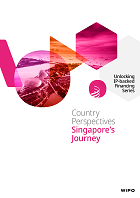Intellectual Property Finance
Moving IP Finance from the Margins to the Mainstream – Discussion Document
This paper describes the potential of IP finance, the challenges it faces, and outlines WIPO’s Action Plan to move IP finance from the margins to the mainstream.
Previous events

IP Finance Dialogue: The Value of Intangible Assets
-
Strengthening IP Valuation Practices in Hungary
December 12, 2025
-
IP Finance 2025 Seminar in Brazil and Launch of the Country Report
December 9, 2025
News
What is IP Finance?
Intellectual property rights can be used to secure financing, either by pledging them or transferring rights to cash flows derived from these assets. Alternatively, a company’s intellectual property can provide an indicator of a firm’s value and support financing decisions. For some businesses, intangible assets only represent a small portion of what a company is worth. For others, the bulk of their value may flow from their intellectual property. These companies must communicate the value of their intellectual property and other intangible assets to lenders and investors.
IP Financing is growing but still largely nascent. Experiments by commercial actors and governments to improve access to finance on the strength of intellectual property are ongoing.
Using IP as collateral
In debt financing, lenders often require borrowers to pledge their assets as collateral when providing a loan. If the borrower defaults, the lender can seize these assets and monetize them to recover some of their losses. Collateralized loans may be easier for a business to secure and may be cheaper than other forms of lending.
Tangible assets, like equipment and buildings owned by a business are often used as collateral. Certain intellectual property assets, like copyrights, designs, and patents, - or revenue streams associated with these assets - are increasingly used to support loans.
When IP is used as collateral, ownership usually remains with the borrower. However, a lender may put certain conditions on how the IP can be used in the future. This could affect the ability to transfer to license the IP or transfer it to others.
Lenders will often file notice of their rights - known as a security interest - to the IP in the case of a borrower’s default on a loan. Depending on a country’s laws, a security interest may be filed through a local IP office or a movable collateral registry. If a lender uses IP as collateral that is held in multiple countries, this process may need to be completed multiple times.
WIPO Report Series on Unlocking IP-backed Finance
To better track and learn from these experiences, WIPO launched a new report series on Unlocking IP-backed Financing, Country Perspectives.
The Series tracks how countries are tackling IP-Backed finance. Each report, developed in partnership with a local partner IP office, a local expert, and WIPO, provides an insider perspective of the situation on the ground. The reports reflect on successes and challenges, as well as the road ahead. This Series provides an opportunity to deepen dialogues around IP-backed financing, sharing best practices and shedding light on what it will take to mainstream.
Early findings from the Report Series on IP Financing
IP Financing in Japan
A number of policy initiatives are changing the way companies think about intellectual property in Japan. This includes:
- the launch of IP Business Valuation Reports facilitate communication in the lending process,
- reference to protecting intellectual property in Japan’s recent Corporate Governance Code revision and
- engagement to raise awareness and the profile of IP financing, as well as in vitalizing domestic economy.
The event was supported by the Japan Patent Office and with financing from the Funds-In-Trust Japan Industrial Property Global.
IP Financing in Singapore
The first report in the series shares Singapore’s journey and the holistic approach the country takes to IP financing. It explores how Singapore has positioned itself to support IP-backed financing, including by developing a robust legal framework and a whole of government approach. Among other initiatives, the pilot Intellectual Property Financing Scheme, is described in detail, where the government shared default risks with participating financial institutions that offered IP-backed loans. The report further describes Singapore’s efforts to create a supportive environment for IP-backed financing, including through disclosure, valuation, and secondary markets for intangible assets. With an eye towards the future, the report identifies challenges faced by the local ecosystem in expanding the availability of IP finance.
As the value of intangible assets including intellectual property (IA/IP) increases, governments are recognizing the need for enterprises to proactively protect, manage and commercialize them to derive maximum benefit for enterprises and the overall economy.
This report gives an account of Singapore’s IA/IP financing journey – the initiatives and the challenges faced, as well as the next steps on the journey to unlock IA/IP financing for innovative enterprises.

Unlocking IP-backed Financing: Country Perspectives - Singapore’s Journey
IP Financing in the United Kingdom

Unlocking IP-backed Financing: Country Perspectives - The United Kingdom’s Journey
UK’s Minister for AI and Intellectual Property, Viscount Camrose, and WIPO Director General Daren Tang launched the report in March 2024.

